人教版(2019)必修1 Unit 3 SPORTS AND FITNESS 单元语法全解 共37页PPT
文档属性
| 名称 | 人教版(2019)必修1 Unit 3 SPORTS AND FITNESS 单元语法全解 共37页PPT | 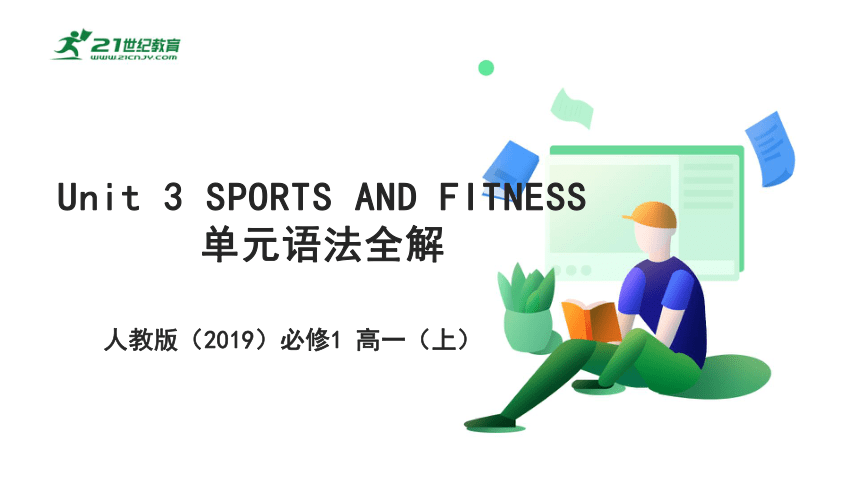 | |
| 格式 | zip | ||
| 文件大小 | 4.7MB | ||
| 资源类型 | 试卷 | ||
| 版本资源 | 人教版(2019) | ||
| 科目 | 英语 | ||
| 更新时间 | 2022-10-25 11:07:27 | ||
图片预览

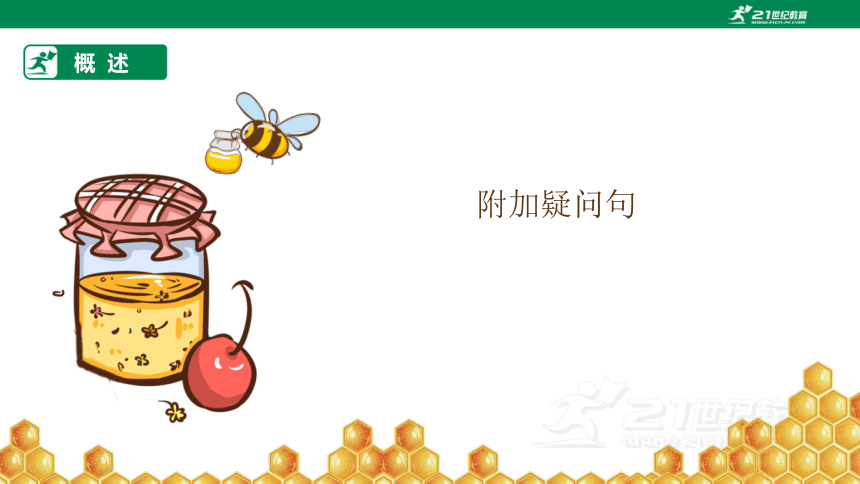
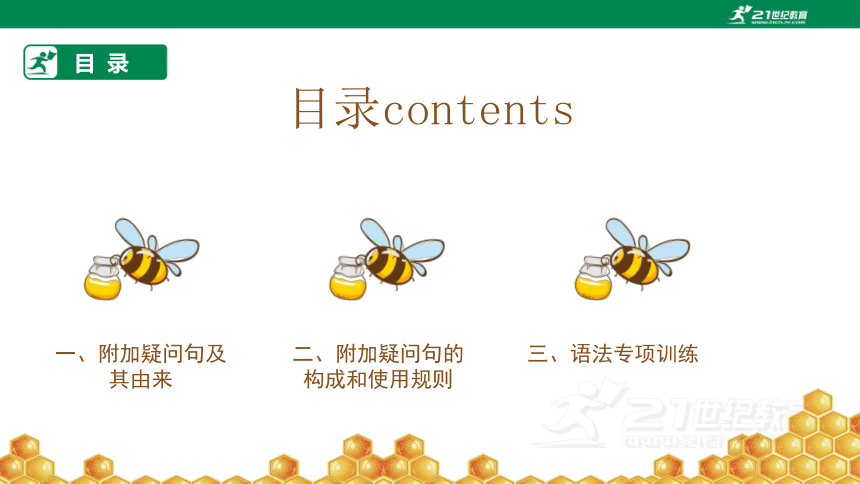
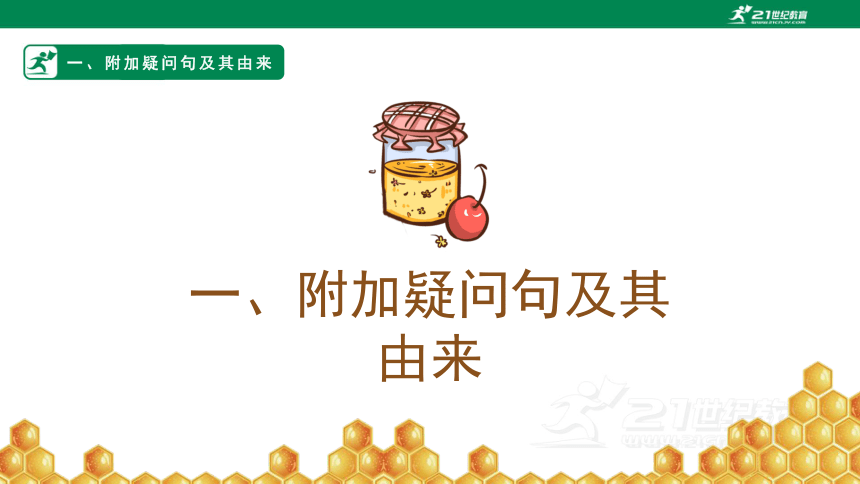
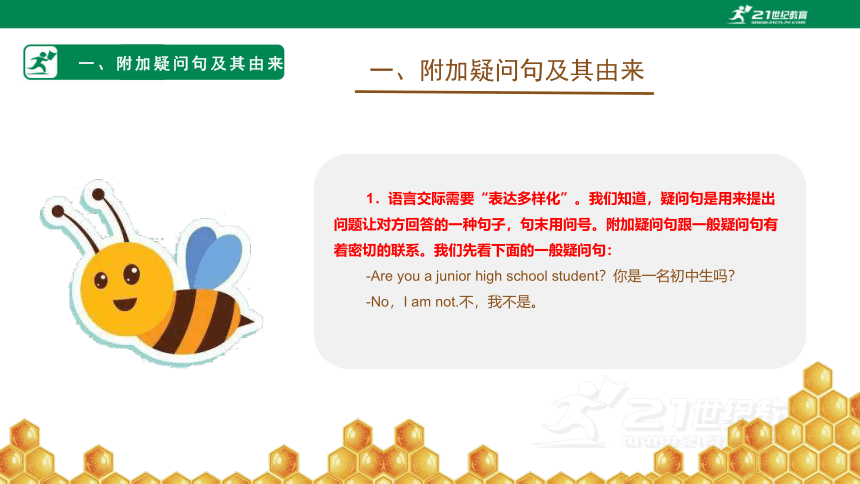
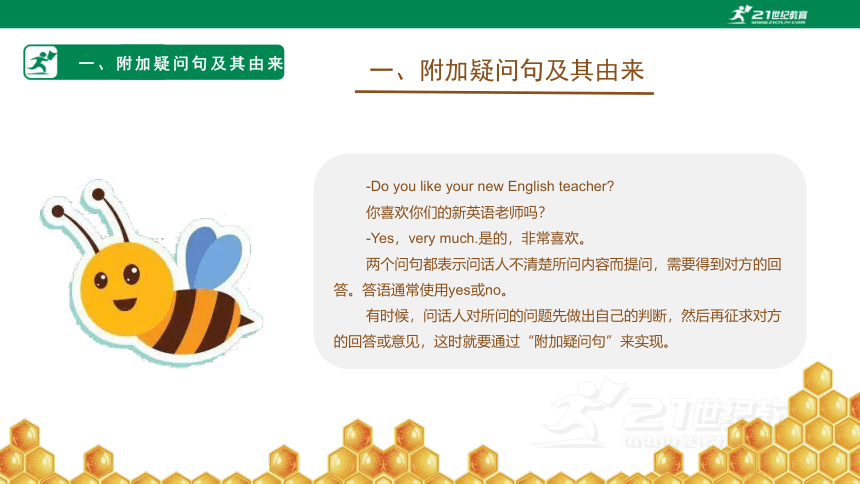

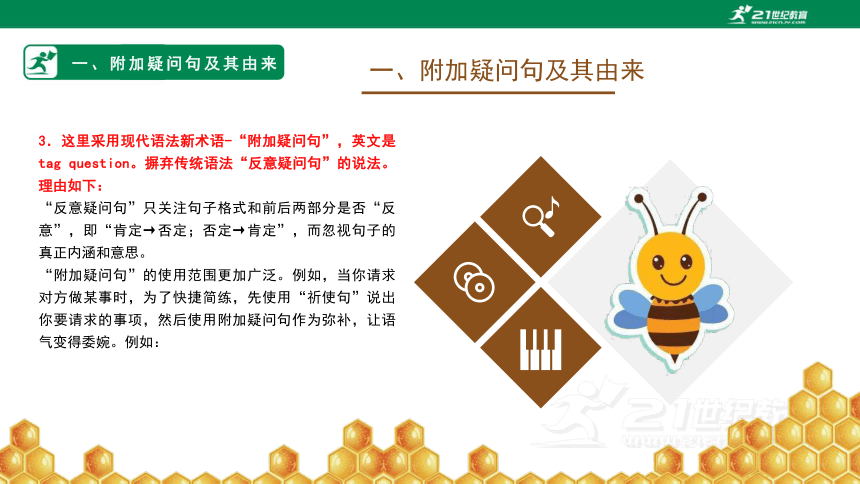
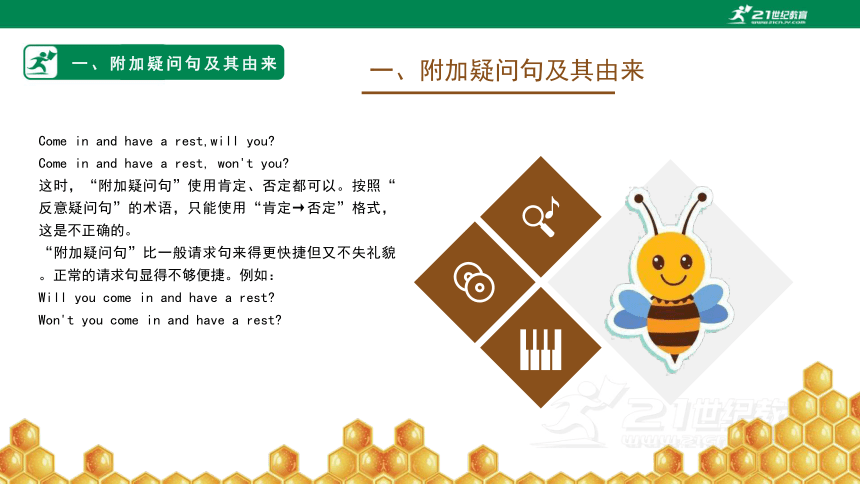

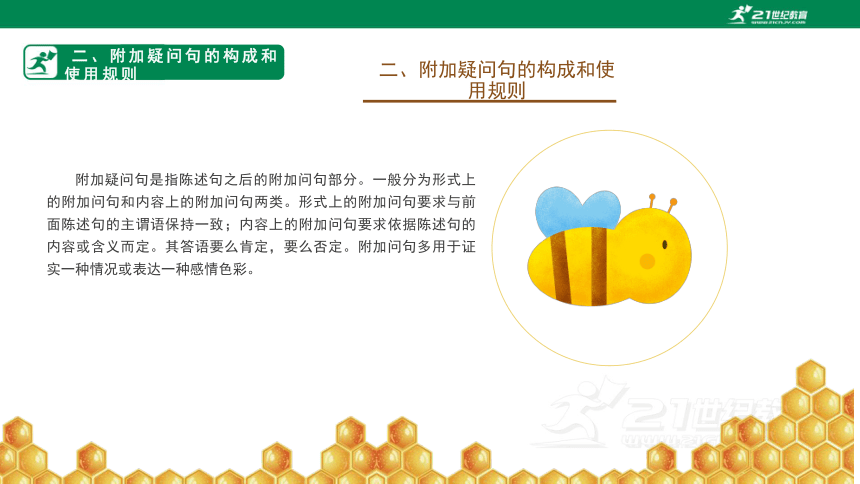
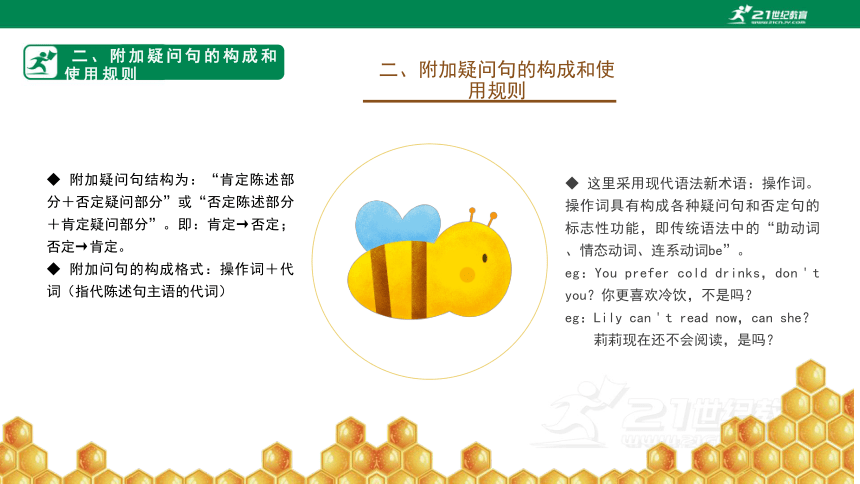
文档简介
(共37张PPT)
Unit 3 SPORTS AND FITNESS
单元语法全解
人教版(2019)必修1 高一(上)
概 述
附加疑问句
目 录
目录contents
一、附加疑问句及其由来
二、附加疑问句的构成和使用规则
三、语法专项训练
一、附加疑问句及其由来
一、附加疑问句及其由来
一、附加疑问句及其由来
一、附加疑问句及其由来
1.语言交际需要“表达多样化”。我们知道,疑问句是用来提出问题让对方回答的一种句子,句末用问号。附加疑问句跟一般疑问句有着密切的联系。我们先看下面的一般疑问句:
-Are you a junior high school student?你是一名初中生吗?
-No,I am not.不,我不是。
一、附加疑问句及其由来
一、附加疑问句及其由来
-Do you like your new English teacher
你喜欢你们的新英语老师吗?
-Yes,very much.是的,非常喜欢。
两个问句都表示问话人不清楚所问内容而提问,需要得到对方的回答。答语通常使用yes或no。
有时候,问话人对所问的问题先做出自己的判断,然后再征求对方的回答或意见,这时就要通过“附加疑问句”来实现。
一、附加疑问句及其由来
2.附加疑问句是一般疑问句的“变异”或“延伸”。问话人先使用陈述句陈述自己的看法或判断,然后追加一个“附加疑问句”,让对方回答,从而证实自己的看法或判断。附加疑问句的答语跟一般疑问句的相同。
-You are a junior high school student,aren't you
-No,I am not.
-You like your new English teacher,don't you
-Yes,very much.
一、附加疑问句及其由来
一、附加疑问句及其由来
3.这里采用现代语法新术语-“附加疑问句”,英文是 tag question。摒弃传统语法“反意疑问句”的说法。理由如下:
“反意疑问句”只关注句子格式和前后两部分是否“反意”,即“肯定→否定;否定→肯定”,而忽视句子的真正内涵和意思。
“附加疑问句”的使用范围更加广泛。例如,当你请求对方做某事时,为了快捷简练,先使用“祈使句”说出你要请求的事项,然后使用附加疑问句作为弥补,让语气变得委婉。例如:
一、附加疑问句及其由来
一、附加疑问句及其由来
Come in and have a rest,will you
Come in and have a rest, won't you
这时,“附加疑问句”使用肯定、否定都可以。按照“反意疑问句”的术语,只能使用“肯定→否定”格式,这是不正确的。
“附加疑问句”比一般请求句来得更快捷但又不失礼貌。正常的请求句显得不够便捷。例如:
Will you come in and have a rest
Won't you come in and have a rest
一、附加疑问句及其由来
二、附加疑问句的构成和使用规则
二、附加疑问句的构成和使用规则
二、附加疑问句的构成和使用规则
附加疑问句是指陈述句之后的附加问句部分。一般分为形式上的附加问句和内容上的附加问句两类。形式上的附加问句要求与前面陈述句的主谓语保持一致;内容上的附加问句要求依据陈述句的内容或含义而定。其答语要么肯定,要么否定。附加问句多用于证实一种情况或表达一种感彩。
二、附加疑问句的构成和使用规则
二、附加疑问句的构成和使用规则
◆ 附加疑问句结构为:“肯定陈述部分+否定疑问部分”或“否定陈述部分+肯定疑问部分”。即:肯定→否定;否定→肯定。
◆ 附加问句的构成格式:操作词+代词(指代陈述句主语的代词)
◆ 这里采用现代语法新术语:操作词。操作词具有构成各种疑问句和否定句的标志性功能,即传统语法中的“助动词、情态动词、连系动词be”。
eg:You prefer cold drinks,don't you?你更喜欢冷饮,不是吗?
eg:Lily can't read now,can she?
莉莉现在还不会阅读,是吗?
二、附加疑问句的构成和使用规则
二、附加疑问句的构成和使用规则
【特别提示】
在回答这类问句时,不管附加问句前面的陈述部分是肯定的还是否定的,肯定的回答都要用yes,否定的回答都要用no,前后形式要保持一致。当陈述部分是否定句时,注意英汉两种语言的差异:答语中的yes译成“不”,no译成“是”。不管对方怎么问,即不管以肯定还是以否定的口吻提问,只需根据实际情况回答即可。
-You didn't visit your first teacher yesterday,did you
你昨天没去拜访你的启蒙老师,是吗?
-No,Ididn't.是的,我没有。
-Yes,Idid.不,我拜访了。
普通的附加问句不再赘述。下面主要讲解一些特殊情况,需要特别理解和记忆。
二、附加疑问句的构成和使用规则
二、附加疑问句的构成和使用规则
这类附加疑问句,主语比较特殊,需要根据陈述句的具体情况而定。
① 陈述部分的主语是指人的不定代词,如:everybody,everyone, somebody, someone, anybody, anyone,nobody, no one,none等时,其附加问句可以用they,也可以用he。
eg:Everyone has his own duty,haven't they
每个人都有自己的职责,不是吗?
eg:No one knows the truth,do they?
没有人知道真相,是吗?
eg:Someone is asking for you at the gate, isn't he
有人在门口要见你,不是吗?
eg:Everyone knows what money means, doesn't he/don't they
每个人都知道钱意味着什么,不是吗?
1.含有特殊主语的附加疑问句
二、附加疑问句的构成和使用规则
② 陈述部分的主语是指物的不定代词,如:everything,something,anything,nothing等时,附加问句用it。
eg:Everything goes well as expected,doesn't it
一切按预料的那样进展顺利,不是吗?
eg:Nothing can stop the wheel of history,can it
没有什么能够阻挡历史车轮的前进,是吗?
③ 陈述部分用不定代词one作主语,附加问句的主语在正式场合用one,在非正式场合可用you。
eg:One can't be too careful,can one/you?人不能太小心,是吗?
eg:One should love his (one's) country,shouldn't one/you
人应该热爱自己的祖国,是不是?
1.含有特殊主语的附加疑问句
二、附加疑问句的构成和使用规则
④ 当陈述部分的主语是指示代词 this,that,these,those时,其后附加问句的主语要用相应的人称代词。即this或 that用it指代,these或 those用they指代。
eg:This is very important,isn't it?这件事很重要,不是吗?
eg:Those are nice,aren't they?
那些很好,不是吗?
⑤ 表示“存在”的there be结构引导陈述部分时,其后的附加问句仍用虚拟主语 there
eg:There used to be a temple here,usedn't/didn't there
过去这里有一座庙,不是吗?
eg:There will be a performance by Jack,won't there
将有一场杰克的演出,不是吗?
1.含有特殊主语的附加疑问句
二、附加疑问句的构成和使用规则
⑥陈述部分的主语是从句、不定式或动名词时,疑问部分的主语用it。
eg:What you said is wrong,isn't it?你说的错了,不是吗?
eg:To learn English well isn't easy,is it
学好英语不容易,是吗?
eg:Practising speaking English every morning will do you good, won't it?每天早上练习说英语会对你有好处,不是吗?
1.含有特殊主语的附加疑问句
二、附加疑问句的构成和使用规则
①含有情态动词must
情态动词must在附加问句中的用法,要根据它在陈述部分中的意义决定。见下表:
2.含有特殊谓语动词的附加疑问句
意义 陈述部分 附加问句部分
必须 You must get up much earlier,你必须更早一点儿起床,You mustn't speak ill of others,你不可以说别人的坏话, mustn't you 好不好?must you 好吗?
有必要 We must have a discussion thisevening,我们今晚需要讨论一下, needn't we 是不是?
一定,肯定 对现在情况的推测 He must be sleeping,他一定是在睡觉, isn't he 是不是?
对过去情况的推测 It must have rainedlast night,昨晚肯定下雨了, didn't it 是不是?
You must have heardabout it,你一定听说过此事, haven't you 是不是?
二、附加疑问句的构成和使用规则
② 含有情态动词 ought to
陈述部分有ought to时,附加问句部分用oughtn't或shouldn'to
eg:We ought to go now, oughtn't/shouldn't we
我们应该现在去,不是吗?
③ 含有 used to
当陈述部分有used to时,附加问句部分用usedn't或didn't均可。
eg:He used to live in London, usedn't/didn't he
他过去住在伦敦,不是吗?
④ 含有 had better
当陈述部分中含有had better时,附加问句部分用hadn't。
eg:You'd better stick to your own principle, hadn't you
你最好坚持你自己的原则,好吗?
2.含有特殊谓语动词的附加疑问句
二、附加疑问句的构成和使用规则
⑤ 含有 have/had to
陈述部分含有have/had to时,附加问句部分通常用do的相应形式。
eg:We have to save the sick panda,don't we
我们必须救助这只生病的熊猫,是吗?
eg:They had to get up at four yesterday, didn't they
他们昨天不得不4点起床,是吗?
⑥ 陈述部分是“I am...”结构时,附加问句部分可以用am I not(正式)或aren'tI(非正式)。
eg:I am older than you,am Inot/aren'tI?
我比你大,是吗?
eg:Believe me! I'm your best friend, am I not/aren't I
相信我!我是你最好的朋友,是吧?
2.含有特殊谓语动词的附加疑问句
二、附加疑问句的构成和使用规则
陈述部分带有 no,never,neither,none,no one,nothing, nobody, nowhere,rarely,hardly,seldom,few,little等表示否定意义的词语时,附加问句一般用肯定式;陈述部分带有含否定前缀或后缀的派生词,如helpless,hopeless,dislike,useless,unable,unfair等时,后面的附加问句仍用否定式。
eg:Your dad seldom smoked at home, did he
你爸爸过去很少在家吸烟,是吗?
eg:The boy knows little about his parents, does he
这个男孩不怎么了解他父母的情况,是吗?
eg: The man is dishonest,isn't he?这个人不诚实,是吗?
eg: She looks unhappy, doesn't she?她看上去不高兴,不是吗?
3.含有否定意义的附加疑问句
二、附加疑问句的构成和使用规则
当陈述部分是祈使句时,附加问句有以下三种情况:
① 祈使句后面的附加问句一般用will you或 won'tyou。
eg:Have a cup of tea,won't you?请喝杯茶,好吗?
eg:Stop that noise,will you?别吵了,行吗?
② 以Let's开头的祈使句,后面的附加问句部分要用shall we。而以 Let us或Let me开头的祈使句,其后的附加问句部分应用will you。因为Let's是邀请含义,包含对方在内,Letus是请求对方允许,不包含对方。
eg:Let's go there,shall we?咱们去那儿吧,好吗?
eg:Let us go there,will you?让我们去那儿吧,行吗?
4.祈使句的附加疑问句
二、附加疑问句的构成和使用规则
当陈述部分是祈使句时,附加问句有以下三种情况:
③ 若陈述部分是否定的祈使句,附加问句部分除了用will you外,也可用can you。
eg: Don't forget it,will you?别忘了它,好吗?
eg: Don't talk any more,can you?别再说话了,好吗?
4.祈使句的附加疑问句
二、附加疑问句的构成和使用规则
在并列句和复合句中,附加问句部分的动词要根据前面讲述的中心内容确定。
①若陈述部分是一个主从复合句,附加问句一般要与主句保持一致。
eg: George said that he taught that guy a good lesson,didn't he
乔治说他狠狠地教训了那个家伙一顿,是吗?
eg: Lance didn't go to bed until he finished his report,did he
兰斯是写完报告才上床睡觉的,是吗?
5.并列句和复合句中的附加疑问句
二、附加疑问句的构成和使用规则
②当陈述部分是“I'm sure/I'm afraid/I don't think (suppose,expect,imagine,believe等)+宾语从句”结构时, 附加问句应与从句保持一致,而且要注意陈述部分的否定转移现象。
eg: I believe he can find her nowhere,can he
我相信他哪里也找不到她,是吗?
eg: I expect that they will win the match, won't they
我希望他们会赢得那场比赛,是吗?
eg: I don't think he is the suitable man for the job, is he
我认为他不是做那项工作的合适人选,不是吗?
5.并列句和复合句中的附加疑问句
二、附加疑问句的构成和使用规则
关于否定转移的“附加疑问句”,需要通过逻辑推理去判断。在阐述某人的观点时,三个不同的人称“你、我、他”,身份是不一样的:问话人是“我”,听者是“你”,“他”不在现场。那么,“附加疑问句”会出现不同的结果:
第一组:
I think this is true,isn't it?(正)
I don't think this is true,is it?(正)
I think this is true,don'tI?(误)
I don't think this is true,do I?(误)
【说明】信息重心在宾语从句,讨论的是“这件事是不是真的”,征求“你”的答复。若用“...do/don'tI?”,那就是自言自语了。
【特别提示】
二、附加疑问句的构成和使用规则
第二组:
You think this is true, don't you?(正)
You don't think this is true,do you?(正)
You think this is true, isn'tit?(误)
You don't think this is true,is it?(误)
【说明】信息重心在主句,讨论的是“你是否持有这个观点”。请比较:
“You think this is true,don't you?”意思是“你认为这是真的,不是吗?(=你不这样认为吗?)”;
假如说“You think this is true,isn't it?”,则意思是“你认为这是真的,它不是真的吗?”——在逻辑上讲不通。
【特别提示】
二、附加疑问句的构成和使用规则
第三组:
(A)He thinks this is true,isn'tit?(正)
(A)He doesn't think this is true,is it?(正)
(B)He thinks this is true,doesn't he?(正)
(B)He doesn't think this is true,does he?(正)
【说明]A组的信息重心在宾语从句,讨论的是“这件事是不是真的”;B组的信息重心在主句,讨论的是“他是否持有这个观点”。两种情况都能讲得通,因为第三者的观点不是“你”“我”的观点,而是间接的转述。
【特别提示】
二、附加疑问句的构成和使用规则
综上,在阐述某人的观点时,三个不同的人称“你、我、他”,身份不一样,角色不一样,问话角度不同:问话人是“我”,听者是“你”,“他”不在现场。那么,附加问句应该是这样设置的:
I(don't)think...的信息重心在“宾语从句”,其附加问句应根据宾语从句设置;
You(don't)think...的信息重心在“主句”,其附加问句应根据主句设置;
He(doesn't)think...的信息重心在“主句或从句”均可,其附加问句根据主句或宾语从句设置均可。
【特别提示】
二、附加疑问句的构成和使用规则
记忆口诀
附加疑问句用法口诀(1)
前肯后否是自然,前否后肯也常见。
问句not若出现,必须缩写是习惯。
肯定事实答yes,否定答no是必然。
前后时态要一致,人称和数要相符。
还有一点要注意,复合代词作主语。
回答附加疑问句,要以事实为依据。
附加疑问句用法口诀(2)
附加疑问并不难,陈述疑问句中含。
前后肯否恰相反,否定词缀不能算。
主谓时态要一致,特殊情况记心间。
实际情况来回答,再把yes和no练。
三、语法专项训练
三、语法专项训练
三、语法专项训练
完成以下各句的“附加疑问句”
1. The athlete likes all kinds of sports, such as soccer, boxing,marathon,skiing,_____?[词汇复现]
2.There will be a badminton match in the stadium this evening, _____?[词汇复现]
3. Gymnastics has been one of her favourite sports events since childhood,_____?[词汇复现]
4. The woman works out regularly for her fitness and sweats now and then,_____?[词汇复现]
5. He was injured in the track and field competition. The injury was not serious,_____?[词汇复现]
三、语法专项训练
完成以下各句的“附加疑问句”
6. These athletes have won championships in many sports events,_____?[词汇复现]
7. We should win not only gold medals, but also honour and glory for our country,_____?[词汇复现]
8. It is said that he is a legend in gymnastics,_____ ?[词汇复现]
9. The athlete didn't lose heart or give up,_____?[词汇复现]
10. The girl will go on a diet with determination and try to be slim and graceful,_____?[词汇复现]
三、语法专项训练
完成以下各句的“附加疑问句”
11.Doing exercise and dieting can make a big difference to your fitness,_____?[词汇复现]
12. Most of the athletes never give up training even if/though they are injured,_____?[词汇复现]
13. Everyone faces failure bravely rather than lose heart,_____?[词汇复现]
14.He gathered all his strength and finally made it,_____ [词汇复现]
15.He seldom competes with the world's gymnastics masters,_____ ?[词汇复现]
三、语法专项训练
完成以下各句的“附加疑问句”
16.In the face of failure,no athletes will lose heart or fall apart,____?[词汇复现]
17. I do some jogging every day, and never cut it out. I think it makes sense to do so,_____?[词汇复现]
18. My fitness has improved a lot compared with the past,_____?[词汇复现]
19.In the face of stress, we ought to have a positive attitude towards life,_____?[词汇复现]
20.The speaker makes few errors in front of the audience,_____?[词汇复现]
语法专项训练
【答案】
1.doesn't he/she;2.won't there;3.hasn't it;4.doesn't she;
5. was it;6.haven't they;7.shouldn't we;8.isn't it;
9.did he/she;10.won't she;11.can't they;12.do they;
13. don't they/doesn't he;14.didn't;15.does he;
16.will they he;17.doesn't it;18.hasn't it
19.shouldn't we/oughtn't we;20.does he/she
谢谢
21世纪教育网(www.21cnjy.com)
中小学教育资源网站
兼职招聘:
https://www.21cnjy.com/recruitment/home/admin
Unit 3 SPORTS AND FITNESS
单元语法全解
人教版(2019)必修1 高一(上)
概 述
附加疑问句
目 录
目录contents
一、附加疑问句及其由来
二、附加疑问句的构成和使用规则
三、语法专项训练
一、附加疑问句及其由来
一、附加疑问句及其由来
一、附加疑问句及其由来
一、附加疑问句及其由来
1.语言交际需要“表达多样化”。我们知道,疑问句是用来提出问题让对方回答的一种句子,句末用问号。附加疑问句跟一般疑问句有着密切的联系。我们先看下面的一般疑问句:
-Are you a junior high school student?你是一名初中生吗?
-No,I am not.不,我不是。
一、附加疑问句及其由来
一、附加疑问句及其由来
-Do you like your new English teacher
你喜欢你们的新英语老师吗?
-Yes,very much.是的,非常喜欢。
两个问句都表示问话人不清楚所问内容而提问,需要得到对方的回答。答语通常使用yes或no。
有时候,问话人对所问的问题先做出自己的判断,然后再征求对方的回答或意见,这时就要通过“附加疑问句”来实现。
一、附加疑问句及其由来
2.附加疑问句是一般疑问句的“变异”或“延伸”。问话人先使用陈述句陈述自己的看法或判断,然后追加一个“附加疑问句”,让对方回答,从而证实自己的看法或判断。附加疑问句的答语跟一般疑问句的相同。
-You are a junior high school student,aren't you
-No,I am not.
-You like your new English teacher,don't you
-Yes,very much.
一、附加疑问句及其由来
一、附加疑问句及其由来
3.这里采用现代语法新术语-“附加疑问句”,英文是 tag question。摒弃传统语法“反意疑问句”的说法。理由如下:
“反意疑问句”只关注句子格式和前后两部分是否“反意”,即“肯定→否定;否定→肯定”,而忽视句子的真正内涵和意思。
“附加疑问句”的使用范围更加广泛。例如,当你请求对方做某事时,为了快捷简练,先使用“祈使句”说出你要请求的事项,然后使用附加疑问句作为弥补,让语气变得委婉。例如:
一、附加疑问句及其由来
一、附加疑问句及其由来
Come in and have a rest,will you
Come in and have a rest, won't you
这时,“附加疑问句”使用肯定、否定都可以。按照“反意疑问句”的术语,只能使用“肯定→否定”格式,这是不正确的。
“附加疑问句”比一般请求句来得更快捷但又不失礼貌。正常的请求句显得不够便捷。例如:
Will you come in and have a rest
Won't you come in and have a rest
一、附加疑问句及其由来
二、附加疑问句的构成和使用规则
二、附加疑问句的构成和使用规则
二、附加疑问句的构成和使用规则
附加疑问句是指陈述句之后的附加问句部分。一般分为形式上的附加问句和内容上的附加问句两类。形式上的附加问句要求与前面陈述句的主谓语保持一致;内容上的附加问句要求依据陈述句的内容或含义而定。其答语要么肯定,要么否定。附加问句多用于证实一种情况或表达一种感彩。
二、附加疑问句的构成和使用规则
二、附加疑问句的构成和使用规则
◆ 附加疑问句结构为:“肯定陈述部分+否定疑问部分”或“否定陈述部分+肯定疑问部分”。即:肯定→否定;否定→肯定。
◆ 附加问句的构成格式:操作词+代词(指代陈述句主语的代词)
◆ 这里采用现代语法新术语:操作词。操作词具有构成各种疑问句和否定句的标志性功能,即传统语法中的“助动词、情态动词、连系动词be”。
eg:You prefer cold drinks,don't you?你更喜欢冷饮,不是吗?
eg:Lily can't read now,can she?
莉莉现在还不会阅读,是吗?
二、附加疑问句的构成和使用规则
二、附加疑问句的构成和使用规则
【特别提示】
在回答这类问句时,不管附加问句前面的陈述部分是肯定的还是否定的,肯定的回答都要用yes,否定的回答都要用no,前后形式要保持一致。当陈述部分是否定句时,注意英汉两种语言的差异:答语中的yes译成“不”,no译成“是”。不管对方怎么问,即不管以肯定还是以否定的口吻提问,只需根据实际情况回答即可。
-You didn't visit your first teacher yesterday,did you
你昨天没去拜访你的启蒙老师,是吗?
-No,Ididn't.是的,我没有。
-Yes,Idid.不,我拜访了。
普通的附加问句不再赘述。下面主要讲解一些特殊情况,需要特别理解和记忆。
二、附加疑问句的构成和使用规则
二、附加疑问句的构成和使用规则
这类附加疑问句,主语比较特殊,需要根据陈述句的具体情况而定。
① 陈述部分的主语是指人的不定代词,如:everybody,everyone, somebody, someone, anybody, anyone,nobody, no one,none等时,其附加问句可以用they,也可以用he。
eg:Everyone has his own duty,haven't they
每个人都有自己的职责,不是吗?
eg:No one knows the truth,do they?
没有人知道真相,是吗?
eg:Someone is asking for you at the gate, isn't he
有人在门口要见你,不是吗?
eg:Everyone knows what money means, doesn't he/don't they
每个人都知道钱意味着什么,不是吗?
1.含有特殊主语的附加疑问句
二、附加疑问句的构成和使用规则
② 陈述部分的主语是指物的不定代词,如:everything,something,anything,nothing等时,附加问句用it。
eg:Everything goes well as expected,doesn't it
一切按预料的那样进展顺利,不是吗?
eg:Nothing can stop the wheel of history,can it
没有什么能够阻挡历史车轮的前进,是吗?
③ 陈述部分用不定代词one作主语,附加问句的主语在正式场合用one,在非正式场合可用you。
eg:One can't be too careful,can one/you?人不能太小心,是吗?
eg:One should love his (one's) country,shouldn't one/you
人应该热爱自己的祖国,是不是?
1.含有特殊主语的附加疑问句
二、附加疑问句的构成和使用规则
④ 当陈述部分的主语是指示代词 this,that,these,those时,其后附加问句的主语要用相应的人称代词。即this或 that用it指代,these或 those用they指代。
eg:This is very important,isn't it?这件事很重要,不是吗?
eg:Those are nice,aren't they?
那些很好,不是吗?
⑤ 表示“存在”的there be结构引导陈述部分时,其后的附加问句仍用虚拟主语 there
eg:There used to be a temple here,usedn't/didn't there
过去这里有一座庙,不是吗?
eg:There will be a performance by Jack,won't there
将有一场杰克的演出,不是吗?
1.含有特殊主语的附加疑问句
二、附加疑问句的构成和使用规则
⑥陈述部分的主语是从句、不定式或动名词时,疑问部分的主语用it。
eg:What you said is wrong,isn't it?你说的错了,不是吗?
eg:To learn English well isn't easy,is it
学好英语不容易,是吗?
eg:Practising speaking English every morning will do you good, won't it?每天早上练习说英语会对你有好处,不是吗?
1.含有特殊主语的附加疑问句
二、附加疑问句的构成和使用规则
①含有情态动词must
情态动词must在附加问句中的用法,要根据它在陈述部分中的意义决定。见下表:
2.含有特殊谓语动词的附加疑问句
意义 陈述部分 附加问句部分
必须 You must get up much earlier,你必须更早一点儿起床,You mustn't speak ill of others,你不可以说别人的坏话, mustn't you 好不好?must you 好吗?
有必要 We must have a discussion thisevening,我们今晚需要讨论一下, needn't we 是不是?
一定,肯定 对现在情况的推测 He must be sleeping,他一定是在睡觉, isn't he 是不是?
对过去情况的推测 It must have rainedlast night,昨晚肯定下雨了, didn't it 是不是?
You must have heardabout it,你一定听说过此事, haven't you 是不是?
二、附加疑问句的构成和使用规则
② 含有情态动词 ought to
陈述部分有ought to时,附加问句部分用oughtn't或shouldn'to
eg:We ought to go now, oughtn't/shouldn't we
我们应该现在去,不是吗?
③ 含有 used to
当陈述部分有used to时,附加问句部分用usedn't或didn't均可。
eg:He used to live in London, usedn't/didn't he
他过去住在伦敦,不是吗?
④ 含有 had better
当陈述部分中含有had better时,附加问句部分用hadn't。
eg:You'd better stick to your own principle, hadn't you
你最好坚持你自己的原则,好吗?
2.含有特殊谓语动词的附加疑问句
二、附加疑问句的构成和使用规则
⑤ 含有 have/had to
陈述部分含有have/had to时,附加问句部分通常用do的相应形式。
eg:We have to save the sick panda,don't we
我们必须救助这只生病的熊猫,是吗?
eg:They had to get up at four yesterday, didn't they
他们昨天不得不4点起床,是吗?
⑥ 陈述部分是“I am...”结构时,附加问句部分可以用am I not(正式)或aren'tI(非正式)。
eg:I am older than you,am Inot/aren'tI?
我比你大,是吗?
eg:Believe me! I'm your best friend, am I not/aren't I
相信我!我是你最好的朋友,是吧?
2.含有特殊谓语动词的附加疑问句
二、附加疑问句的构成和使用规则
陈述部分带有 no,never,neither,none,no one,nothing, nobody, nowhere,rarely,hardly,seldom,few,little等表示否定意义的词语时,附加问句一般用肯定式;陈述部分带有含否定前缀或后缀的派生词,如helpless,hopeless,dislike,useless,unable,unfair等时,后面的附加问句仍用否定式。
eg:Your dad seldom smoked at home, did he
你爸爸过去很少在家吸烟,是吗?
eg:The boy knows little about his parents, does he
这个男孩不怎么了解他父母的情况,是吗?
eg: The man is dishonest,isn't he?这个人不诚实,是吗?
eg: She looks unhappy, doesn't she?她看上去不高兴,不是吗?
3.含有否定意义的附加疑问句
二、附加疑问句的构成和使用规则
当陈述部分是祈使句时,附加问句有以下三种情况:
① 祈使句后面的附加问句一般用will you或 won'tyou。
eg:Have a cup of tea,won't you?请喝杯茶,好吗?
eg:Stop that noise,will you?别吵了,行吗?
② 以Let's开头的祈使句,后面的附加问句部分要用shall we。而以 Let us或Let me开头的祈使句,其后的附加问句部分应用will you。因为Let's是邀请含义,包含对方在内,Letus是请求对方允许,不包含对方。
eg:Let's go there,shall we?咱们去那儿吧,好吗?
eg:Let us go there,will you?让我们去那儿吧,行吗?
4.祈使句的附加疑问句
二、附加疑问句的构成和使用规则
当陈述部分是祈使句时,附加问句有以下三种情况:
③ 若陈述部分是否定的祈使句,附加问句部分除了用will you外,也可用can you。
eg: Don't forget it,will you?别忘了它,好吗?
eg: Don't talk any more,can you?别再说话了,好吗?
4.祈使句的附加疑问句
二、附加疑问句的构成和使用规则
在并列句和复合句中,附加问句部分的动词要根据前面讲述的中心内容确定。
①若陈述部分是一个主从复合句,附加问句一般要与主句保持一致。
eg: George said that he taught that guy a good lesson,didn't he
乔治说他狠狠地教训了那个家伙一顿,是吗?
eg: Lance didn't go to bed until he finished his report,did he
兰斯是写完报告才上床睡觉的,是吗?
5.并列句和复合句中的附加疑问句
二、附加疑问句的构成和使用规则
②当陈述部分是“I'm sure/I'm afraid/I don't think (suppose,expect,imagine,believe等)+宾语从句”结构时, 附加问句应与从句保持一致,而且要注意陈述部分的否定转移现象。
eg: I believe he can find her nowhere,can he
我相信他哪里也找不到她,是吗?
eg: I expect that they will win the match, won't they
我希望他们会赢得那场比赛,是吗?
eg: I don't think he is the suitable man for the job, is he
我认为他不是做那项工作的合适人选,不是吗?
5.并列句和复合句中的附加疑问句
二、附加疑问句的构成和使用规则
关于否定转移的“附加疑问句”,需要通过逻辑推理去判断。在阐述某人的观点时,三个不同的人称“你、我、他”,身份是不一样的:问话人是“我”,听者是“你”,“他”不在现场。那么,“附加疑问句”会出现不同的结果:
第一组:
I think this is true,isn't it?(正)
I don't think this is true,is it?(正)
I think this is true,don'tI?(误)
I don't think this is true,do I?(误)
【说明】信息重心在宾语从句,讨论的是“这件事是不是真的”,征求“你”的答复。若用“...do/don'tI?”,那就是自言自语了。
【特别提示】
二、附加疑问句的构成和使用规则
第二组:
You think this is true, don't you?(正)
You don't think this is true,do you?(正)
You think this is true, isn'tit?(误)
You don't think this is true,is it?(误)
【说明】信息重心在主句,讨论的是“你是否持有这个观点”。请比较:
“You think this is true,don't you?”意思是“你认为这是真的,不是吗?(=你不这样认为吗?)”;
假如说“You think this is true,isn't it?”,则意思是“你认为这是真的,它不是真的吗?”——在逻辑上讲不通。
【特别提示】
二、附加疑问句的构成和使用规则
第三组:
(A)He thinks this is true,isn'tit?(正)
(A)He doesn't think this is true,is it?(正)
(B)He thinks this is true,doesn't he?(正)
(B)He doesn't think this is true,does he?(正)
【说明]A组的信息重心在宾语从句,讨论的是“这件事是不是真的”;B组的信息重心在主句,讨论的是“他是否持有这个观点”。两种情况都能讲得通,因为第三者的观点不是“你”“我”的观点,而是间接的转述。
【特别提示】
二、附加疑问句的构成和使用规则
综上,在阐述某人的观点时,三个不同的人称“你、我、他”,身份不一样,角色不一样,问话角度不同:问话人是“我”,听者是“你”,“他”不在现场。那么,附加问句应该是这样设置的:
I(don't)think...的信息重心在“宾语从句”,其附加问句应根据宾语从句设置;
You(don't)think...的信息重心在“主句”,其附加问句应根据主句设置;
He(doesn't)think...的信息重心在“主句或从句”均可,其附加问句根据主句或宾语从句设置均可。
【特别提示】
二、附加疑问句的构成和使用规则
记忆口诀
附加疑问句用法口诀(1)
前肯后否是自然,前否后肯也常见。
问句not若出现,必须缩写是习惯。
肯定事实答yes,否定答no是必然。
前后时态要一致,人称和数要相符。
还有一点要注意,复合代词作主语。
回答附加疑问句,要以事实为依据。
附加疑问句用法口诀(2)
附加疑问并不难,陈述疑问句中含。
前后肯否恰相反,否定词缀不能算。
主谓时态要一致,特殊情况记心间。
实际情况来回答,再把yes和no练。
三、语法专项训练
三、语法专项训练
三、语法专项训练
完成以下各句的“附加疑问句”
1. The athlete likes all kinds of sports, such as soccer, boxing,marathon,skiing,_____?[词汇复现]
2.There will be a badminton match in the stadium this evening, _____?[词汇复现]
3. Gymnastics has been one of her favourite sports events since childhood,_____?[词汇复现]
4. The woman works out regularly for her fitness and sweats now and then,_____?[词汇复现]
5. He was injured in the track and field competition. The injury was not serious,_____?[词汇复现]
三、语法专项训练
完成以下各句的“附加疑问句”
6. These athletes have won championships in many sports events,_____?[词汇复现]
7. We should win not only gold medals, but also honour and glory for our country,_____?[词汇复现]
8. It is said that he is a legend in gymnastics,_____ ?[词汇复现]
9. The athlete didn't lose heart or give up,_____?[词汇复现]
10. The girl will go on a diet with determination and try to be slim and graceful,_____?[词汇复现]
三、语法专项训练
完成以下各句的“附加疑问句”
11.Doing exercise and dieting can make a big difference to your fitness,_____?[词汇复现]
12. Most of the athletes never give up training even if/though they are injured,_____?[词汇复现]
13. Everyone faces failure bravely rather than lose heart,_____?[词汇复现]
14.He gathered all his strength and finally made it,_____ [词汇复现]
15.He seldom competes with the world's gymnastics masters,_____ ?[词汇复现]
三、语法专项训练
完成以下各句的“附加疑问句”
16.In the face of failure,no athletes will lose heart or fall apart,____?[词汇复现]
17. I do some jogging every day, and never cut it out. I think it makes sense to do so,_____?[词汇复现]
18. My fitness has improved a lot compared with the past,_____?[词汇复现]
19.In the face of stress, we ought to have a positive attitude towards life,_____?[词汇复现]
20.The speaker makes few errors in front of the audience,_____?[词汇复现]
语法专项训练
【答案】
1.doesn't he/she;2.won't there;3.hasn't it;4.doesn't she;
5. was it;6.haven't they;7.shouldn't we;8.isn't it;
9.did he/she;10.won't she;11.can't they;12.do they;
13. don't they/doesn't he;14.didn't;15.does he;
16.will they he;17.doesn't it;18.hasn't it
19.shouldn't we/oughtn't we;20.does he/she
谢谢
21世纪教育网(www.21cnjy.com)
中小学教育资源网站
兼职招聘:
https://www.21cnjy.com/recruitment/home/admin
